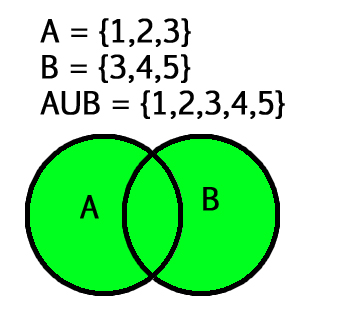两个给定集合的并集是包含两个集合的所有元素的最小集合。两个给定集合A和B的并集是一个由A的所有元素和B的所有元素组成的集合,这样就不会重复任何元素。

表示集合并集的符号是“ U”。示例:
Input:Let set A = {2, 4, 5, 6}
and set B = {4, 6, 7, 8}
Output:{2, 4, 5, 6, 7, 8}
Explanation:Taking every element of both the sets A and B,
without repeating any element, we get a
new set = {2, 4, 5, 6, 7, 8}.This new set
contains all the elements of set A and all the elements
of set B with no repetition of elements and is
named as union of set A and B.
用法:
set1.union(set2, set3, set4….)
In parameters, any number of sets can be given
返回值:
The union() function returns a set, which has the union of all sets(set1, set2, set3…) with set1.
It returns a copy of set1 only if no parameter is passed.
以下是上述方法的Python3实现:
# Python3 program for union() function
set1 = {2, 4, 5, 6}
set2 = {4, 6, 7, 8}
set3 = {7, 8, 9, 10}
# union of two sets
print("set1 U set2:", set1.union(set2))
# union of three sets
print("set1 U set2 U set3:", set1.union(set2, set3))输出:
set1 U set2: {2, 4, 5, 6, 7, 8}
set1 U set2 U set3:{2, 4, 5, 6, 7, 8, 9, 10}
实际应用:
在大多数概率问题中,需要集合并集的概念。
相关用法
- Python Pandas Index.union()用法及代码示例
- Python Pandas TimedeltaIndex.union()用法及代码示例
- Python oct()用法及代码示例
- Python map()用法及代码示例
- Python int()用法及代码示例
- Python cmp()用法及代码示例
- Python id()用法及代码示例
- Python dir()用法及代码示例
注:本文由纯净天空筛选整理自Striver大神的英文原创作品 Union() function in Python。非经特殊声明,原始代码版权归原作者所有,本译文未经允许或授权,请勿转载或复制。
